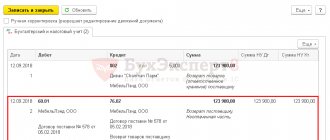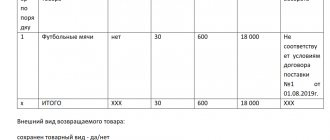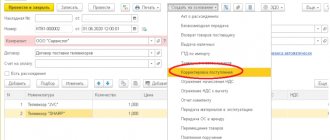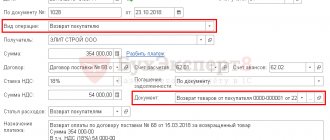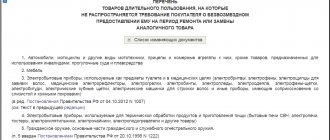If the supplier has shipped a low-quality or incomplete product to the organization, the buyer can return it. There may also be other reasons for return, it depends on the terms of the supply agreement.
The Civil Legislation of the Russian Federation establishes several grounds on which goods can be returned. These are cases of non-compliance:
- quality;
- assortment;
- set;
- containers and packaging.
Thus, current legislation allows you to return goods to the supplier in the following cases:
- if the buyer has not received complete information about the characteristics of the product;
- The supplier did not ship the required quantity. In this case, the buyer may refuse the entire lot;
- the product is not fully completed;
- the supplier regularly violates delivery deadlines;
- the quality does not meet the terms of the contract;
- The products were shipped without packaging or containers.
In this article, we will consider what primary documents should be used to document the return of goods to the supplier.
How to arrange for a buyer to return goods to a supplier
The return of goods to the supplier is accompanied by a return invoice (for example, in form N TORG-12 with the note: “Return of goods”) or an act of returning goods to the supplier.
Documents for returning goods from the buyer to the supplier are transferred along with the returned goods.
In addition, the buyer sends a letter (claim) to the supplier demanding acceptance of the returned goods, indicating the reason for their return.
If the goods are returned to the supplier by power of attorney, then in this case, when registering it, you can use form No. M-2 (clause 2.1.4 of the Methodological Recommendations, approved by Letter of the RF Committee on Trade dated July 10, 1996 N 1-794/32-5 ).
In this case, the buyer does not need to issue an invoice for the return of goods.
A simple model for responding to buyer aggression
The sequence is:
1. Localize the conflict. Find out the reasons for dissatisfaction.
2. Try to convince the client to start negotiations. To negotiate.
3. Take your mind off the conflict. Regain strength using stress management techniques.
Let's look at each point in detail.
Letter of claim requesting the supplier to accept goods returned by the buyer
If, during the acceptance of the delivered goods or after its acceptance, it is revealed that the goods do not comply with the requirements for their quality, the buyer has the right, at his own discretion, to refuse to execute the sales contract, return the low-quality goods and demand a refund of the amount of money paid for it, or demand replacement of this product with a product of proper quality (clause 2 of Article 475 of the Civil Code of the Russian Federation).
The buyer sets out his requirements in the form of a claim, which is sent to the supplier (for example, for the return of goods). The norms of the current legislation of the Russian Federation do not provide for an established form of claim for the return of goods to the supplier.
The letter of claim is drawn up in any form.
The letter states:
- full name and details of the buyer and supplier;
- number and date of the purchase and sale (supply) agreement;
- number and date of accompanying documents for the delivered goods;
- name of the product, its quantity and cost;
- detected discrepancy (malfunction);
- links to regulations;
- requirement to satisfy the claim (request for replacement, refund, reduction of amount, etc.).
The claim is signed by the head of the organization, indicating his position and his full name, and certified by the company seal (if any).
The letter of claim is handed over to the authorized representative of the supplier against signature or sent to him by registered mail with a list of the attachments.
Lawyers advise
The reality is that, along with real problems and adequate customers who are committed to constructively resolving the conflict, online stores are faced with “consumer terrorism.” Due to the dissemination of information and the “flexibility” of current laws, buyers begin to abuse their rights. To “separate the wheat from the chaff,” lawyers advise developing internal instructions for working with controversial cases.
How to avoid abuse?
- Provide the buyer with all information about the product. Do this in a timely manner and in full so that unnecessary interpretations and misunderstandings do not arise.
- Document the fact of transfer of information. This must be done directly on the site, even before making a purchase.
- Clearly regulate the internal policies of the online store. Develop an algorithm for employees to follow in the event of a product return. Provide for all possible scenarios and create a “memo” for each case. It’s better for your employee to use a “cheat sheet” than to set you up with his incompetent behavior.
- Write your own text of the contract, in which, taking into account Russian legislation, add clauses that seem reasonable and fair to you. A standard agreement, copied from colleagues, in practice may not work in your favor.
- Take care of the internal corporate culture and introduce your own recommendations and rules of conduct with clients. This is relevant not only for large online stores, but also for small sites whose managers are interested in the positive image of their business.
Judicial practice in the field of IT business shows that those companies that at the initial stage took care of conveying to the client clear and competent information about the product and methods of its delivery are more successful in resolving conflicts.
Avoid questionable wording, write in Russian (of course, if you work for a Russian-speaking audience), inform the client of all changes in a timely manner, provide information in a clear and accessible form - then there will be fewer problems!
VAT when returning goods to the supplier
VAT when returning goods to the supplier is required to be processed according to the following rules:
- The seller prepares an adjustment invoice and records it in the purchase ledger.
- The buyer registers the seller's adjustment invoice in the sales book (if he managed to accept VAT for deduction, if not, then he accepts the deduction in the non-refundable part).
Please note that it does not matter for what reason the return occurs.
This is how the return of both defective and high-quality goods is processed if it does not comply with the contract.
Concept of consumer protection
Any citizen has the right to receive a product or service of appropriate quality that is safe for his life and health. The law also guarantees him the right to full information and redress.
According to the Law of the Russian Federation “On the Protection of Consumer Rights” No. 2300-1 of 02/07/1992 (hereinafter referred to as the RFPP), a citizen-consumer has two options to protect his rights. At the first stage, pre-trial protection is provided, that is, actions in the claims procedure.
The buyer independently tries to resolve the issue, and the seller (manufacturer or performer) has the opportunity to voluntarily satisfy the consumer’s demands, if they are justified. In this way, the violated consumer right is restored.
At the second stage, the case goes through judicial (claim) proceedings. In addition to the buyer of goods or services himself, other authorized bodies involved in protecting the rights of citizens can apply to the court on his behalf.
Claim proceedings in most cases are beneficial to both parties. It allows you to quickly and without additional costs establish all the circumstances of the dispute and, if necessary, take measures to restore the buyer’s rights. It is recommended that you contact a professional lawyer to file a claim.
Return of low-quality goods to the supplier if a defect is detected immediately upon acceptance of the goods
In this case, the purchasing organization may simply not accept the damaged goods.
In this case, it is enough to correct the invoice TORG-12 - without documenting the return of low-quality goods to the supplier.
That is, if the supplier is ready to take back expired products, then from the TORG-12 consignment note issued by the supplier, the purchasing organization deletes the necessary items - those items that are defective.
Please note that corrections in the receipt document must be made in the presence of the supplier or his representative - a forwarder or driver, vested with the rights of a financially responsible person.
The specified person must sign next to the crossed out item and pick up the defective product.
In addition, the supplier must not only accept the defect back, but also adjust the invoice for the purchasing organization downward and send it to the purchasing organization within 5 business days, since less goods were actually purchased.
At the same time, in the invoice, in the adjustment lines, the supplier indicates those goods that he must accept from the buyer.
Note that in practice another option is often used, namely, additional delivery of quality goods at another time, but without paperwork. That is, the purchasing organization accepts the entire delivery, signing the invoice without adjustments. And the supplier delivers the missing quality goods a little later. This is a common case when the buyer has established a trusting relationship with the supplier.
Crisis in wallets and heads
Two years of crisis have changed the situation. If earlier employers were forced to put up with the boorish behavior of their staff, especially during personnel shortages in the market, now they do not want to deal with aggressive employees. The reason is the decrease in the purchasing power of the population. In exchange for a purchase, customers are allowed to do whatever they want. But the rights of sellers have diminished.
There is less money, depressive moods are growing, wages, on the contrary, are not increasing. In such a situation, rarely does anyone think about shopping “for pleasure” - about unnecessary, excessive or unreasonable spending. Problems are increasing like a snowball - people are losing their jobs, they cannot pay off loans. Hopes are crumbling, old dreams look naive. A cloud of fatigue and irritation hung over us all.
The body requires release - aggression needs to be thrown out. But to whom? Arguing with your superiors is more expensive for yourself. Getting involved with one of your relatives is fraught with even bigger problems. It’s a nice thing to pour out all the accumulated negativity on the seller! It's simple, fast and affordable - sellers are always nearby; It is very easy to get to the bottom of them even for the smallest reason.
Return of defective goods to the supplier after acceptance
There are situations when the purchasing organization cannot return the defective product to the supplier immediately, although the defect was discovered at the time of acceptance.
For example, the delivery was from another region, and the transport company - the seller's delivery contractor - does not accept anything back.
In this case, despite the defect, the purchasing organization will have to accept the products according to the TORG-12 invoice, draw up a statement of discrepancies in quantity and quality, and place the inventory items in its warehouse.
And only after this the purchasing organization can write a claim and wait for its consideration by the supplier.
Consumer protection when purchasing online
When purchasing goods online, the same laws and regulations apply as when purchasing in brick-and-mortar stores. A defective item or item can be returned before the end of its warranty period. If the product weighs more than 5 kg, the online store is responsible for its delivery to the service center. He takes care of the delivery to the service center or pays for it (clause 7, article 18 of the PZPP).
The product remains in the service center for a period of no more than 45 days (Clause 1, Article 20). If a certificate is issued stating that the product cannot be repaired, the seller is obliged to return the buyer’s money or make an exchange.
Where to go if consumer rights are violated
If his rights are violated and the seller refuses to satisfy his claims, the buyer has the right to file a corresponding complaint with one of the institutions whose responsibilities include protecting the interests of citizens.
List of institutions to contact:
- Local branch of Rospotrebnadzor. A 24-hour toll-free hotline is provided for citizens.
- Local branch of the Consumer Protection Society.
- Department of the consumer market under local governments.
- Prosecutor's office.
A complaint can be submitted by personal visit or through the MFC. And if contacting these organizations does not give the desired result, you need to go to court.



